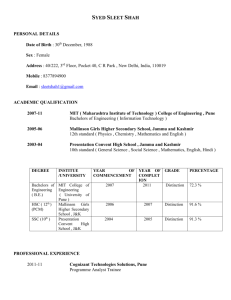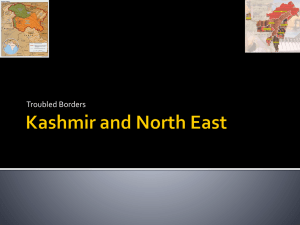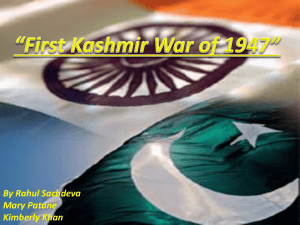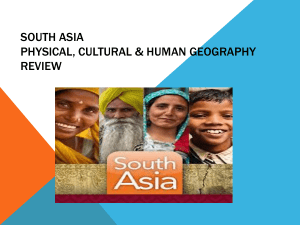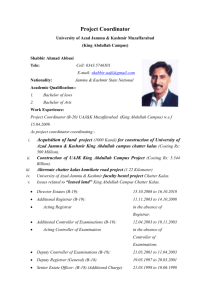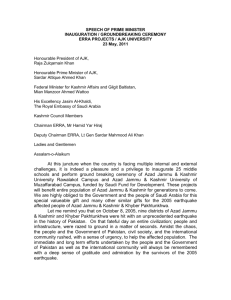study guide - Delhi Public School, Guwahati
advertisement
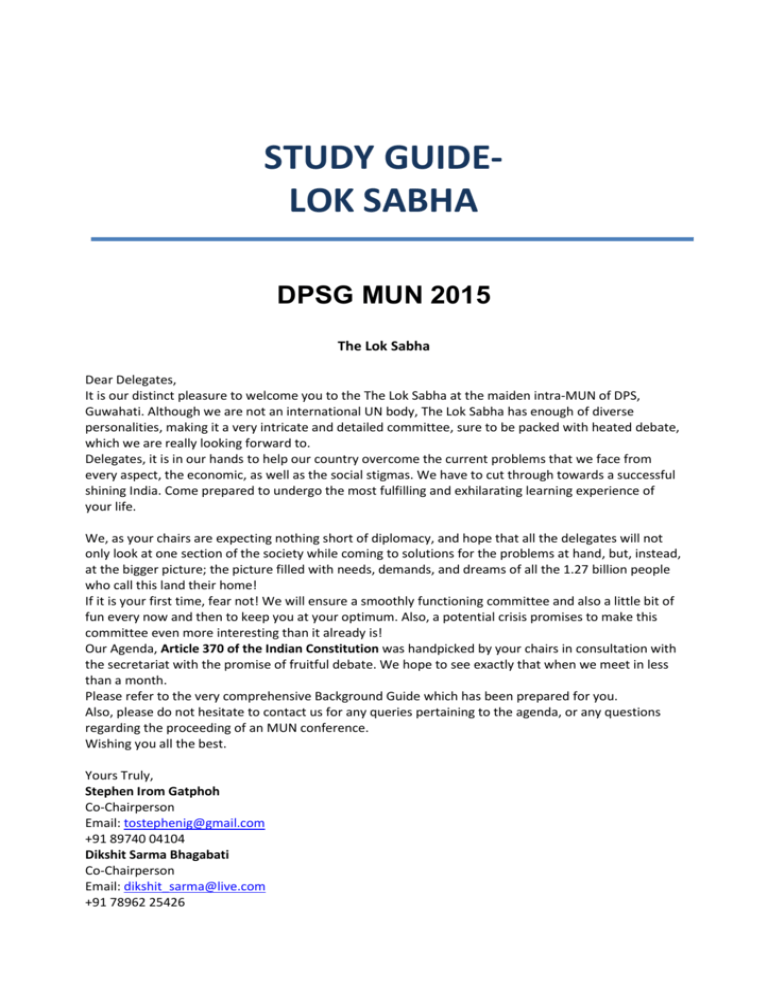
STUDY GUIDELOK SABHA DPSG MUN 2015 The Lok Sabha Dear Delegates, It is our distinct pleasure to welcome you to the The Lok Sabha at the maiden intra-MUN of DPS, Guwahati. Although we are not an international UN body, The Lok Sabha has enough of diverse personalities, making it a very intricate and detailed committee, sure to be packed with heated debate, which we are really looking forward to. Delegates, it is in our hands to help our country overcome the current problems that we face from every aspect, the economic, as well as the social stigmas. We have to cut through towards a successful shining India. Come prepared to undergo the most fulfilling and exhilarating learning experience of your life. We, as your chairs are expecting nothing short of diplomacy, and hope that all the delegates will not only look at one section of the society while coming to solutions for the problems at hand, but, instead, at the bigger picture; the picture filled with needs, demands, and dreams of all the 1.27 billion people who call this land their home! If it is your first time, fear not! We will ensure a smoothly functioning committee and also a little bit of fun every now and then to keep you at your optimum. Also, a potential crisis promises to make this committee even more interesting than it already is! Our Agenda, Article 370 of the Indian Constitution was handpicked by your chairs in consultation with the secretariat with the promise of fruitful debate. We hope to see exactly that when we meet in less than a month. Please refer to the very comprehensive Background Guide which has been prepared for you. Also, please do not hesitate to contact us for any queries pertaining to the agenda, or any questions regarding the proceeding of an MUN conference. Wishing you all the best. Yours Truly, Stephen Irom Gatphoh Co-Chairperson Email: tostephenig@gmail.com +91 89740 04104 Dikshit Sarma Bhagabati Co-Chairperson Email: dikshit_sarma@live.com +91 78962 25426 KNOW YOUR AGENDA Agenda: Discussion on Article 370 of the Constitution of India Quick Tip: Tip: Article Article 370 370 isis that that article article in in the the Indian Indian Constitution Constitution which which grants grantsthe the Quick state of of Jammu Jammu and and Kashmir Kashmir some some special special privileges privileges and andautonomies autonomies. state HISTORY OF JAMMU AND KASHMIR Hari Singh had ascended the throne of Kashmir in 1925 and was the reigning monarch at the conclusion of British rule in the subcontinent in 1947. One of the conditions of the partition of India imposed by Britain was that the rulers of princely states would have the right to opt for either Pakistan or India or remain independent. In 1947, Kashmir's population was predominantly Muslim and it shared a boundary with both Dominion of Pakistan and Union of India. On 20 October 1947, tribesmen backed by Pakistan invaded Kashmir. The Maharaja initially fought back but appealed for assistance to the Governor- General Louis Mountbatten, who agreed on the condition that the ruler accede to India. On 25 October 1947 Maharaja Hari Singh signed the Instrument of Accession on 26 October 1947 and the Governor General of India accepted it on 27 October 1947. Once the Instrument of Accession was signed, Indian soldiers entered Kashmir with orders to evict the raiders, but they were not able to expel everyone from the state by the time the harsh winter started. India took the matter to the United Nations. The UN resolution asked both India and Pakistan to vacate the areas they had occupied and hold a referendum under UN observation. The holding of this plebiscite, which India initially supported, was dismissed by India because the 1952 elected Constituent Assembly of Jammu and Kashmir voted in favor of confirming the Kashmir region's accession to India. Another reason for the abandonment of the referendum is because demographic changes after 1947 have been effected in Pakistan-administered Kashmir, as generations of Pakistani individuals non-native to the region have been allowed to take residence in Pakistan-administered Kashmir, in Jammu & Kashmir state of India, the demographics of the Kashmir Valley have been altered after separatist militants coerced 250,000 Kashmiri Hindus to leave the region. Moreover, Pakistan failed to withdraw its troops from the Kashmir region as was required under the same U.N. resolution of 13 August 1948 which discussed the plebiscite. Diplomatic relations between India and Pakistan soured for many other reasons and eventually resulted in three further wars in Kashmir the Indo-Pakistani War of 1965, the Indo-Pakistan War of 1971 and the Kargil War in 1999. India has control of 60% of the area of the former Princely State of Jammu and Kashmir (Jammu, Kashmir Valley, and Ladakh); Pakistan controls 30% of the region (Gilgit–Baltistan and Azad Kashmir). China occupied 10% (Aksai Chin) of the state in 1962. The eastern region of the erstwhile princely state of Kashmir has also been beset with a boundary dispute. In the late 19th- and early 20th centuries, although some boundary agreements were signed between Great Britain, Tibet, Afghanistan and Russia over the northern borders of Kashmir, China never accepted these agreements, and the official Chinese position did not change with the communist revolution in 1949. By the mid-1950s the Chinese army had entered the northeast portion of Ladakh. By 1956–57 they had completed a military road through the Aksai Chin area to provide better communication between Xinjiang and western Tibet. India's belated discovery of this road led to border clashes between the two countries that culminated in the Sino-Indian war of October 1962. China has occupied Aksai Chin since 1962 and, in addition, an adjoining region, the TransKarakoram Tract was ceded by Pakistan to China in 1963. For intermittent periods between 1957, when the state approved its own Constitution, and the death of Sheikh Abdullah in 1982, the state had alternating spells of stability and discontent. In the late 1980s, however, simmering discontent over the high-handed policies of the Union Government and allegations of the rigging of the 1987 assembly elections triggered a violent uprising, which was backed by Pakistan. Members of Parliament, you must keep in mind this history when you come for Session in August, and be well researched into the ongoing activities in the Valley. It is your primary objective to ensure a better future to the people of Jammu & Kashmir. THE TEXT OF ARTICLE 370 OF THE Article 370 of the Constitution of India 1. Notwithstanding anything in this Constitution: CONSTITUTION OF INDIA the provisions of article 238(now repealed) shall not apply in relation to the State of Jammu and Kashmir, a) The power of Parliament to make laws for the said State shall be limited to; i. Those matters in the Union List and the Concurrent List which, in consultation with the Government of the State, are declared by the President to correspond to matters specified in the Instrument of Accession governing the accession of the State to the Dominion of India as the matters with respect to which the Dominion Legislature may make laws for that State; and ii. Such other matters in the said Lists, as, with the concurrence of the Government of the State, the President may by order specify. b) Explanation— For the purpose of this article, the Government of the State means the person for the time being recognized by the President as the Maharajah of Jammu and Kashmir acting on the advice of the Council of Ministers for the time being in office under the Maharaja’s Proclamation dated the fifth day of March, 1948; c) The provisions of article 1 and of this article shall apply in relation to this State; d) d. Such of the other provisions of this Constitution shall apply in relation to that State subject to such exceptions and modifications as the President may by order specify i. Provided that no such order which relates to the matters specified in the Instrument of Accession of the State referred to in paragraph (i.) of sub-clause (a) shall be issued except in consultation with the Government of the State: (ii.) Provided further that no such order which relates to matters other than those referred to in the last preceding proviso shall be issued except with the concurrence of the Government. 2. If the concurrence of the Government of the State referred to in paragraph (ii.) of sub-clause (a) of clause (1) or in second proviso to sub-clause (d) of that clause be given before the Constituent Assembly for the purpose of framing the Constitution of the State is convened, it shall be placed before such Assembly for such decision as it may take thereon. 3. Notwithstanding anything in the foregoing provisions of the article, the President may, by public notification, declare that this article shall cease to be operative or shall be operative only with such exceptions and modifications and from such date as he may notify: Provided that the recommendation of the Constituent Assembly of the State referred to in clause (2) shall be necessary before the President issues such a notification. 4. In exercise of the powers conferred by this article the President, on the recommendation of the Constituent Assembly of the State of Jammu and Kashmir, declared that, as from the 17th day of November, 1952, the said art. 370 shall be operative with the modification that for the explanation incl. In exercise of the powers conferred by this article the President, on the recommendation of the Constituent Assembly of the State of Jammu and Kashmir, declared that, as from the 17th day of November, 1952, the said art. 370 shall be operative with the modification that for the explanation in cl.(1) thereof the following Explanation is substituted namely: Explanation—For the purpose of this Article, the Government of the State means the person for the time being recognized by the President on the recommendation of the Legislative Assembly of the State as the *Sadar-IRiyasat of Jammu and Kashmir, acting on the advice of Council of Ministers of the State for the time being in office. INDIRA-SHEIKH ACCORD 1974 Indira–Sheikh accord was signed by on behalf of Sheikh Abdullah and then Prime Minister of India Indira Gandhi whereby Sheikh became the chief minister of Jammu and Kashmir again after 11 years. The text of the agreement is reproduced below: 1. The State of Jammu and Kashmir which is a constituent unit of the Union of India, shall, in its relation with the Union, continue to be governed by Article 370 of the Constitution of India. 2. The residuary powers of legislation shall remain with the State; however, Parliament will continue to have power to make laws relating to the prevention of activities directed towards disclaiming, questioning or disrupting the sovereignty and territorial integrity of India or bringing about cession of a part of the territory of India or secession of a part of the territory of India from the Union or causing insult to the Indian National Flag, the Indian National Anthem and the Constitution. 3. Where any provision of the Constitution of India had been applied to the State of Jammu and Kashmir with adaptation and modification, such adaptations and modifications can be altered or repealed by an order of the President under Article 370, each individual proposal in this behalf being considered on its merits; but provisions of the Constitution of India already applied to the State of Jammu and Kashmir without adaptation or modification are unalterable. 4. With a view to assuring freedom to the State of Jammu and Kashmir to have its own legislation on matters like welfare measures, cultural matters, social security, personal law and procedural laws, in a manner suited to the special conditions in the State, it is agreed that the State Government can review the laws made by Parliament or extended to the State after 1953 on any matter relatable to the Concurrent List and may decide which of them, in its opinion, needs amendment or repeal. Thereafter, appropriate steps may be taken under Article 254 of the Constitution of India. The grant of President’s assent to such legislation would be sympathetically considered. The same approach would be adopted in regard to laws to be made by Parliament in future under the Provision to clause 2 of the Article. The State Government shall be consulted regarding the application of any such law to the State and the views of the State Government shall receive the fullest consideration. 5. As an arrangement reciprocal to what has been provided under Article 368, a suitable modification of that Article as applied to State should be made by Presidential order to the effect that no law made by the Legislature of the State of Jammu and Kashmir, seeking to make any change in or in the effect of any provision of Constitution of the State of Jammu and Kashmir relating to any of the under mentioned matters, shall take effect unless the Bill, having been reserved for the consideration of the President, receives his assent ; the matters are: a. The appointment, powers, functions, duties, privileges and immunities of the Governor, and b. The following matters relating to Elections namely, the Superintendence, direction and control of Elections by the Election Commission of India, eligibility for inclusion in the electoral rolls without discrimination, adult suffrage and composition of the Legislative Council, being matters specified in sections 138,139, 140 and 50 of the Constitution of the State of Jammu and Kashmir. 6. No agreement was possible on the question of nomenclature of the Governor and the Chief Minister and the matter is therefore remitted to the Principals. IMPLICATIONS OF ARTICLE 370 OF THE CONSTITUTION OF INDIA This article specifies that except for Defense, Foreign Affairs, Finance and Communications,(matters specified in the instrument of accession) the Indian Parliament needs the State Government's concurrence for applying all other laws. Thus the state's residents lived under a separate set of laws, including those related to citizenship, ownership of property, and fundamental rights, as compared to other Indians. Similar protections for unique status exist in tribal areas of India including those in Himachal Pradesh, Arunachal Pradesh, Andaman & Nicobar Islands and Nagaland. The Government of India vide 1974 Indira-Sheikh accord committed itself to keeping the relationship between the Union and Jammu and Kashmir State within the ambit of this article . The 1974 Indira-Sheikh accord mentions that “The State of Jammu and Kashmir which is a constituent unit of the Union of India, shall, in its relation with The Union, continue to be governed by Article 370 of the Constitution of India” . Indian citizens from other states and women from Jammu & Kashmir who marry men from other states cannot purchase land or property in Jammu & Kashmir. Sheikh Mohammad Abdullah, the state's 'Prime Minister' and leader of the Muslims in the Vale, found the inclusion of Article 370 in the 'Temporary and Transitional Provisions' of the Constitution's Part XXI unsettling. He wanted 'iron clad guarantees of autonomy'. Suspecting that the state's special status might be lost, Abdullah advocated independence from India, causing New Delhi to dismiss his government in 1953, and place him under preventive detention. Some argue that the President may, by public notification under article 370(3), declare that Article 370 shall cease to be operative and no recommendation of the Constituent Assembly is needed as it does not exist any longer. Others say it can be amended by an amendment Act under Article 368 of the Constitution and the amendment extended under Article 370(1). Art. 147 of the Constitution of Jammu and Kashmir states no Bill or amendment seeking to make any change in the provisions of the constitution of India as applicable in relation to the State; shall be introduced or moved in either house of the Legislature. As per Art. 5 of the Constitution of Jammu and Kashmir the executive and legislative power of the State extends to all matters except those with respect to which Parliament has power to make laws for the State under the provisions of the Constitution of India as applicable in relation to this state. PART XXI OF THE CONSTITUTION OF INDIA (for reference) Part XXI consists of Articles on Temporary, Transitional and Special Provisions. Articles 369 - 378A on Temporary, Transitional and Special Provisions Article 379 - 391 - Repealed - Replaced by the Constitution (Seventh Amendment) Act, 1956. DEMAND FOR ABROGATION OF ARTICLE 370 Equally valid arguments are forwarded by those in favour of and those against its abrogation. Those in favour argue that it has created certain psychological barriers. They say that it is the root cause of all the problems in J&K. The further believe that it is this Article 370 which encourages secessionist activities within J&K and other parts of the country. They say, at the time of enactment, it was a temporary arrangement which was supposed to erode gradually. They also argue that it acts as a constant reminder to the Muslims of J&K that they have still to merge with the country. Those against its abrogation forward the following arguments. They contend that that Abrogation will have serious consequences. It will encourage Secessionists to demand plebiscite which will lead to internationalisation of the issue of J&K. They further argue that the contention of Article giving rise to secessionist activities is baseless as states like Assam and Punjab, which don’t have any special status have experienced such problems. It would not only constitute a violation of the solemn undertaking given by India through the instrument of accession, but would also give unnecessary misgivings in the minds of the people of J&K, making the issue more sensitive. LK ADVANI- OMAR ABDULLAH SPAT OVER ARTICLE 370 National Conference working president and Jammu and Kashmir Chief Minister Omar Abdullah was the first Kashmiri rabble-rouser to use abusive language against the BJP leaders of mass experience. Omar Abdullah, who invariably speaks the language of Pakistan despite being the executive head of the State, warned the BJP leadership that Article 370 could be abrogated only over their ‘dead bodies’. He administered the warning and demanded resumption of a ‘sustained and meaningful’ dialogue with Pakistan on June 25 in the presence of the Prime Minister Manmohan Singh who, as expected, kept mum. The conduct of the Prime Minister gave everyone to understand that he was perhaps in complete accord with Omar Abdullah, who had been creating problem after problem for India since January 2009, when the National Conference and the Congress formed a coalition Government in Jammu and Kashmir. LK Advani replied to Omar’s impressively wrote the following: accusation through his blog and Omar Abdullah, Chief Minister of Jammu and Kashmir State, has every right to disagree with the BJP on matters relating to J&K. But I would advise him never to use offensive language and words like ‘cheating’ and ‘deceiving’ in that context. He should know that when in the Constituent Assembly, Art. 370, which confers a Special Status on Jammu and Kashmir state was sought to be approved, the Jana Sangh had not even been born. However, if there was any provision in the Draft Constitution which had almost the entire Congress Party up in arms against it, it was this provision. This issue was considered by the Constituent Assembly in November, 1949 just two months before the Constitution was formally adopted. Prime Minister Pandit Nehru had left for abroad. According to a two-volume book My Reminiscences of Sardar Patel, written by V. Shankar, Private Secretary to the Union Home Minister Sardar Patel, before leaving for abroad, Pandit Nehru finalized the draft provisions with Sheikh Abdullah, and entrusted to Gopalaswamy Ayyangar the task of piloting these provisions through the Constituent Assembly. Ayyangar first presented his proposals to the Congress Parliamentary Party. His presentation, Shankar notes, provoked “a storm of angry protests from all sides, and Gopalaswamy Ayyangar found himself a lone defender with Maulana Azad an ineffective supporter”. According to Shankar, “In the party, there was a strong body of opinion which looked askance at any suggestion of discrimination between the Jammu and Kashmir State and other States as members of the future Indian Union and was not prepared to go beyond certain limits in providing for the special position of Jammu and Kashmir. “Sardar was himself fully in accord with this opinion, but due to his usual policy of not standing in the way of Pandit Nehru and Gopalaswamy Ayyangar who sorted out problems in their own light, he had kept his own views in the background. In fact, he had not taken any part in framing the draft proposals with the result that he heard the proposals only when Gopalaswamy Ayyangar announced them to the Congress Party.” Extremely upset with the rough reception he had received at the Congress Parliamentary Party, Ayyangar rushed to Sardar Patel for help. Sardar Patel had another meeting of the Congress Parliamentary Party convened. Shankar reports: “The meeting was one of the stormiest I have ever witnessed. Even Maulana Azad was shouted down. It was left to Sardarto bring the discussion down to the practical plane and to plead that because of the international complications, a provisional approach alone could be made.” “Reluctantly, it seems, the Congress Party fell in line with the Sardar’s wishes. Indeed it is this that explains why in the Constituent Assemblythe discussion on this provision was so vapid and sketchy. Apart from Ayyangar’s own speech, there was not a single worthwhile intervention, either for, or against.” It transpires that even while Sardar Patel and Ayyangar were exerting hard to make the Congress Party agree to the draft proposals as drawn up by Ayyangar and Sheikh Abdullah with Pandit Nehru before his departure to abroad, Sheikh started having second thoughts about the agreed draft itself. On 14th October, 1949, Vishnu Sahay, Secretary for Kashmir Affairs in the Home Ministry wrote to V. Shankar that Sheikh Abdullah had changed his stand on the draft on the plea that the Working Committee of the National Conference did not approve of it. Abdullah, Sahay wrote, had sent an alternative draft which provided that the Indian Constitution shall apply to Jammu & Kashmir only in regard to the acceded subjects. The Sheikh also objected to the fact that the proposed Article had been described as Temporary and that the Constituent Assembly of the State had been empowered to terminate it. On 15 October, 1949, Sheikh Abdullah and two colleagues of his met Ayyangar and pressured him into changing the draft. Ayyangar reported this to Sardar Patel that very day. In his letter to Patel dated 15 October, Ayyangar wrote that “there was no substance at all in the objections that they (Abdullah and his two colleagues) had put forward”. He added: “At the end of it all, I told them that I had not expected that, after having agreed to the substance of our draft both at your house (Patel’s) and at the Party meeting, they would let me and Panditji down in the manner they were attempting to do. In answer, Sheikh Abdullah said that he felt very grieved that I should think so, but that in the discharge of his duty to his own people he found it impossible to accept our draft as it was …… I told him thereafter to go back and think over all that I have told them and hoped that he would come back to me in a better frame of mind in the course of the day or tomorrow. I have since thought over the matter further and dictated a draft which, without giving up the essential stand we have taken in our original draft, readjusts it in minor particulars in a way which I am hoping Sheikh Abdullah would agree to.” Sardar Patel’s reply to Ayyangar dated 16th October, 1949 was curt and sharp. He did not agree with Ayyangar that the changes were minor. Patel wrote: “I find there are substantial changes over the original draft, particularly in regard to the applicability of fundamental rights and directive principles of State policy. You can yourself realize the anomaly of the State becoming part of India and at the same time not recognizing any of these provisions.” Patel added: “I do not at all like any change after our party has approved the whole arrangement in the presence of Sheikh Sahib himself. of Whenever Sheikh Sahib wishes to back out, he always contfronts us with his duty to the people. Of course, he owes no duty to India or to the Indian Government, or even on a personal basis, to you and the Prime Minister who have gone all out to accommodate him.” In a clinching remark he said: “In these circumstances, any question of my approval does not arise. If you feel it is the right thing to do, you can go ahead with it.” Meanwhile, Sheikh Abdullah rejected even Ayyangar’s revised draft, and in a letter addressed to Ayyangar on 17th October threatened to resign from the Constituent Assembly. On 17th October, 1949, the Constituent Assembly adopted Ayyangar’s original draft without much of a debate. Sheikh Abdullah was expected to speak, but he remained sullen and silent. After Nehruji’s return from abroad, Sardar Patel summed up the happenings which took place in his absence (letter dated 3rd November, 1949) in the following words : “My dear Jawaharlal, There was some difficulty about the provision relating to Kashmir. Sheikh Sahib went back on the agreement which he had reached with you in regard to the provision relating to Kashmir. He insisted on certain changes of a fundamental character which would exclude in their application to Kashmir the provisions relating to citizenship and fundamental rights and make it necessary in all these matters as well as others not covered by the accession to three subjects to seek the concurrence of the State Government which is sought to be defined as the Maharaja acting on the advice of the Council of Ministers appointed under the proclamation of 8 March 1948. After a great deal of discussion, I could persuade the party to accept all the changes except the last one, which was modified so as to cover not merely the first Ministry so appointed but any subsequent Ministries which may be appointed under that proclamation. Sheikh Sahib has not reconciled himself to this change, but we could not accommodate him in this matter and the provision was passed through the House as we had modified. After this he wrote a letter to Gopalaswami Ayyangar threatening to resign from the membership of the Constituent Assembly. Gopalaswami has replied asking him to defer his decision until your return. Yours sincerely, Vallabhbhai Patel” TAILPIECE Sardar Patel passed away in December, 1950. On July 24, 1952, Pandit Nehru made a comprehensive statement in the Lok Sabha on issues relating to Jammu and Kashmir State. In this he strongly defended Art. 370. He also remarked that it was Sardar Patel who was dealing with J.& K. V. Shankar, who in 1952 was Joint Secretary in Ayyangar’s Ministery ran into his Minister and exchanged notes about the happening. Gopalaswamy Ayyangar commented: “It is an ill – return to Sardar for the magnanimity he had shown in accepting Panditji’s point of view against his better judgement. To this Omar wrote on the micro-blogging site Twitter:“Instead of advising me to show restraint, Advani Ji should devote some blog space to explain his silence over Article 370 between 19982004” It would not be out of place to mention that on July 22, 2008, Omar Abdullah said in the Lok Sabha, “We will not give an inch of land to the Amarnath Shrine Board (for the creation of more facilities for the pilgrims) as the land belongs to us” and on March 25, 2013, he challenged Parliament by questioning its March 13, 2013 unanimous resolution on Jammu and Kashmir saying, “By terming Jammu and Kashmir as atoot Ang of India, you cannot change the political status of the State”. In between, he repeatedly attacked the Indian Army, demanded revocation of the Armed Forces Special Powers Act (AFSPA), condemned the laws and facilitated the return to Kashmir of over 240 Pakistan-based terrorists of Kashmir origin. Members of Parliament, the August Session serves as a platform for a heated debate between, the BJP and the NC over article 370. It is advised that each one of you is thorough with the stand of their party and is capable of expressing his/her opinion on this issue. SUGGESTED READING QUICK TIP: For a more comprehensive background research, do not rely entirely on the study guide or the suggested links. As the saying goes, ‘being a good delegate requires more efforts than reading from the first page of wikipedia’ The following is a list of suggested documents that must be read by the Members of Parliament, to be well versed with the issue of Article 370:- 1) “The Truth about Article 370” -Arvind Lavakare Document available on: http://www.esamskriti.com/essays/docfile/RMP-Lavakare-F.pdf 2) “THE JAMMU AND KASHMIR STATE SUBJECTS CONTROVERSY OF 2004” -Sehla Ashai Document available on: http://www.earlemacklaw.drexel.edu/~/media/Files/law/law%20revi ew/spring_2010/Ashai53755.ashx 3) “INDIA Human Rights Report” Issue 2 outlines and gives a perspective on the abuse of article 370 Document available on: http://www.achrweb.org/ihrrq/issue2/ihrrq-oct-dec-2010.pdf 4) The necessary text:Document available on: http://www.kashmiralight.com/images/artilce370.pdf 5) “Article 370: A Constitutional Impediment to Resolving the Kashmir Crisis” -Subodh Atal Document available on: http://ikashmir.net/slides/doc/article370.pdf 6) “Curfewed Night” –Bashrat Peer Document available on: http://www.amazon.in/Curfewed-Night-Basharat-Peerebook/dp/B008MXWTN8?tag=googinhydr18418-21&tag=googinkenshoo21&ascsubtag=0eafe2c2-6332-4227-b90f-1c58a316f88a GEOGRAPHY OF JAMMU AND KASHMIR QUESTIONS TO THE MEMBERS OF PARLIAMENT 1) Is the abrogation of Article 370 a valid argument? 2) What are the amendments possible to Article 370? 3) What should India’s stance be on Jammu and Kashmir and Pakistan’s association with the state? 4) Can there be a special Minister for the State of Jammu and Kashmir? 5) What is the future course of action that must be taken in order to firm India’s stance on Jammu and Kashmir? 6) How does the Indian Parliament plan on fulfilling the special demands of the people of Jammu and Kashmir? 7) Is there a possibility of a solution supported by all parties in the Lok Sabha? 8) Who is right? LK Advani or Omar Abdullah? 9) Is Pakistan a Valid Party to the conflict? Quick Tip: Aforementioned questions are to be pondered upon by the MPs during the committee sessions. These are to be answered substantively during speeches, and should be the highlights of the working papers or bills (resolution). MPs should feel free to throw other questions to the house.
